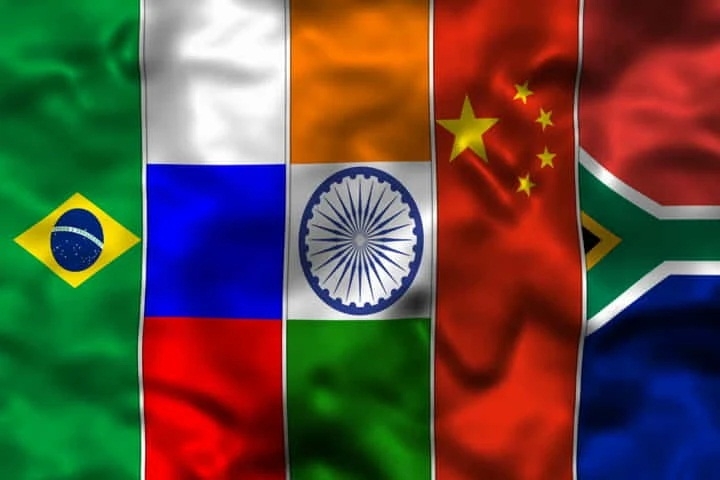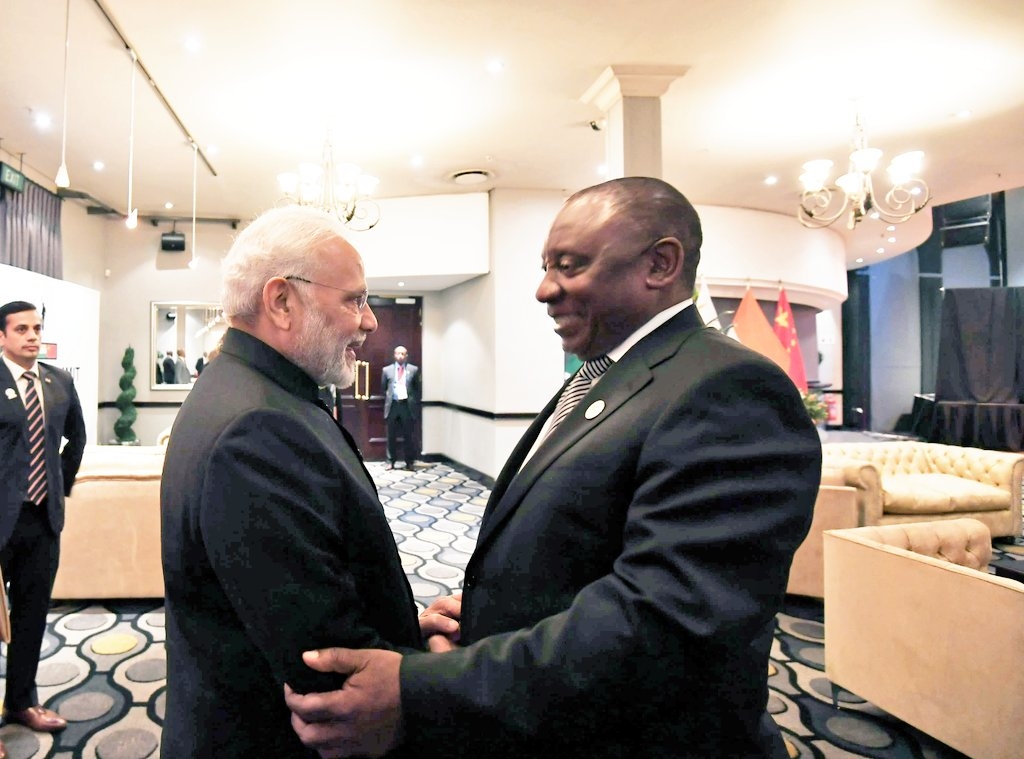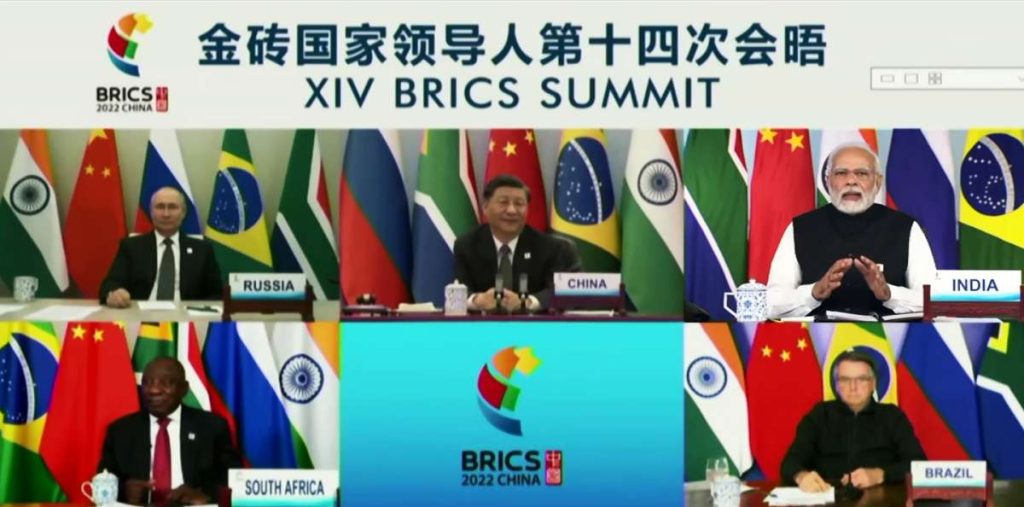As a founding member, India must continue to leverage the multilateral platform it has created. It would be imprudent to vacate spaces in international frameworks because of the Chinese presence….writes Sanjay Pulipaka
Very rarely, in international politics, do we see a multilateral framework evolve based on a report by an investment bank. In 2001, referring to the economic potential of Brazil, Russia, India, and China, the Goldman Sachs report coined the acronym BRIC. After a series of preparatory meetings, the first BRIC Summit was organised in 2009. With South Africa becoming a member in 2010, BRIC became BRICS.
In a few days, the 15th BRICS Summit will be held in South Africa and will witness in-person participation by the leaders of all member states except Russia. Russian Foreign Minister Sergey Lavrov will attend the Summit instead of President Vladimir Putin.
The South African President, Cyril Ramaphosa, has launched a massive outreach inviting approximately 67 heads of government, mainly from Latin America and Africa, to the BRICS summit and thus far, about 50 confirmations were received. The United Nations Secretary-General António Guterres will also be joining deliberations.
The South African government is seeking to convert the BRICS into one of the largest meetings on issues concerning the global South. On the other hand, there has been considerable discussion in the media that the Summit aims to undermine the Western and, more specifically, the US dominance in global politics.
In the run-up to the Summit, there was considerable discussion on expanding the membership of the BRICS. From the perspective of India and other developing countries, the membership expansion should be guided by sound principles and not by an intent to create a new bloc in global politics. The expansion should seek to bridge and not intensify global faultlines and should not privilege one member country over others. Making the BRICS an “anti” grouping will undermine the efforts to reform the global institutions and weaken the attempts to amplify the voices of the developing countries.

There is a view among some South African experts that framing the Summit deliberations only through the lens of global faultlines will shift the focus away from the needs of Africa, Latin America and other developing countries. They point out that the theme of the Summit – ‘BRICS and Africa’ – was conceptualised to facilitate discussion on ‘partnership for mutually accelerated growth, sustainable development and inclusive multilateralism.’ There is an expectation that BRICS should strive to boost investments, trade and create value chains in Africa by utilising its natural resources, particularly in mining and raw materials.
There were suggestions that the BRICS should develop a common currency. However, such a step would require creating a new central bank involving member states and greater coordination of the existing national central banks. Unlike the Euro area, the BRICS countries have varied political systems. There is also significant variation in the autonomy/transparency mechanisms governing the functioning of the central banks of BRICS countries. Therefore, BRICS common currency project is fraught with numerous challenges, which may undermine the financial autonomy of the developing countries. Moreover, countries such as India are trying to increase the international usage of their national currency.
Instead, deliberations should focus on increasing the activities of the existing BRICS institutions, such as the New Development Bank (NDB). Reports show that in nearly a decade, the NDB ‘has approved only $33 billion of loans.” There are suggestions that NDB should do more to protect member countries from foreign exchange fluctuations, raise capital, and increase lending in multiple currencies.

Over the years, India proactively participated in the deliberations, activities and also defined the agenda of the BRICS. As the BRICS Chair in 2021, India reiterated the importance of reforming the multilateral system. In 2016, it was under the India chairship that the first meeting of the BRICS Working Group on Counter-Terrorism was organised. Under the rubric of the BRICS National Security Advisors’ Meeting, India is working to scale up cooperation to contain transnational organised crime, improve cyber security, and work toward peace and stability in the international system.
India has been leveraging the BRICS framework to scale up cooperation in socio-economic realms. In addition to the BRICS TB Research Network Initiative, India has promised to work with BRICS countries in developing digital health innovations, healthcare service delivery and integrated early warning systems to mitigate future health crises. During the pandemic, India supplied vaccines to Brazil and South Africa. India firm in collaboration with Russian Direct Investment Fund manufactured Sputnik V vaccines. Further, India has collaborated with BRICS countries to ‘setup a network of genomic surveillance and study the overlap of SARS-CoV-2 with tuberculosis.’

To promote financial inclusion, India expressed its willingness to jointly develop innovative and inclusive digital/technological tools that suit local economies. To increase the yields and incomes of smaller farmers, India has launched the BRICS Agricultural Research Platform (BRICS-ARP) by providing the latest technologies. In tune with BRICS’ emphasis on cooperation on disaster resilience, the Indian government launched Coalition for Disaster Resilient Infrastructure (CDRI), in 2019, at the United Nations Climate Action Summit. Further, through India, Brazil and South Africa (IBSA) Dialogue Forum, Delhi is implementing development projects and working for women’s empowerment in developing countries.
Given that China is an important member of the BRICS, there are concerns about whether India should increase its engagement with the grouping. It is indeed true that India-China relations have experienced severe stress in the recent past. India has responded to the aggressive tactics of China in the Galwan Valley and initiated measures to reduce economic dependence in the long run. As a founding member, India must continue to leverage the multilateral platform it has created. It would be imprudent to vacate spaces in international frameworks because of the Chinese presence. On the other hand, India should work to ensure that multilateral frameworks function in a transparent manner, ensure equitable outcomes and promote rules-based international order. Such an approach will not only reduce space for aggressive actions but will also prevent the emergence of blocs that undermine peace in the global system. It is in the interest of liberal democracies worldwide that India scales up its engagement with the BRICS.














